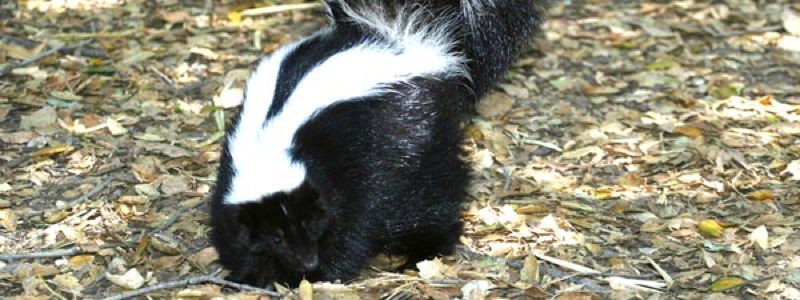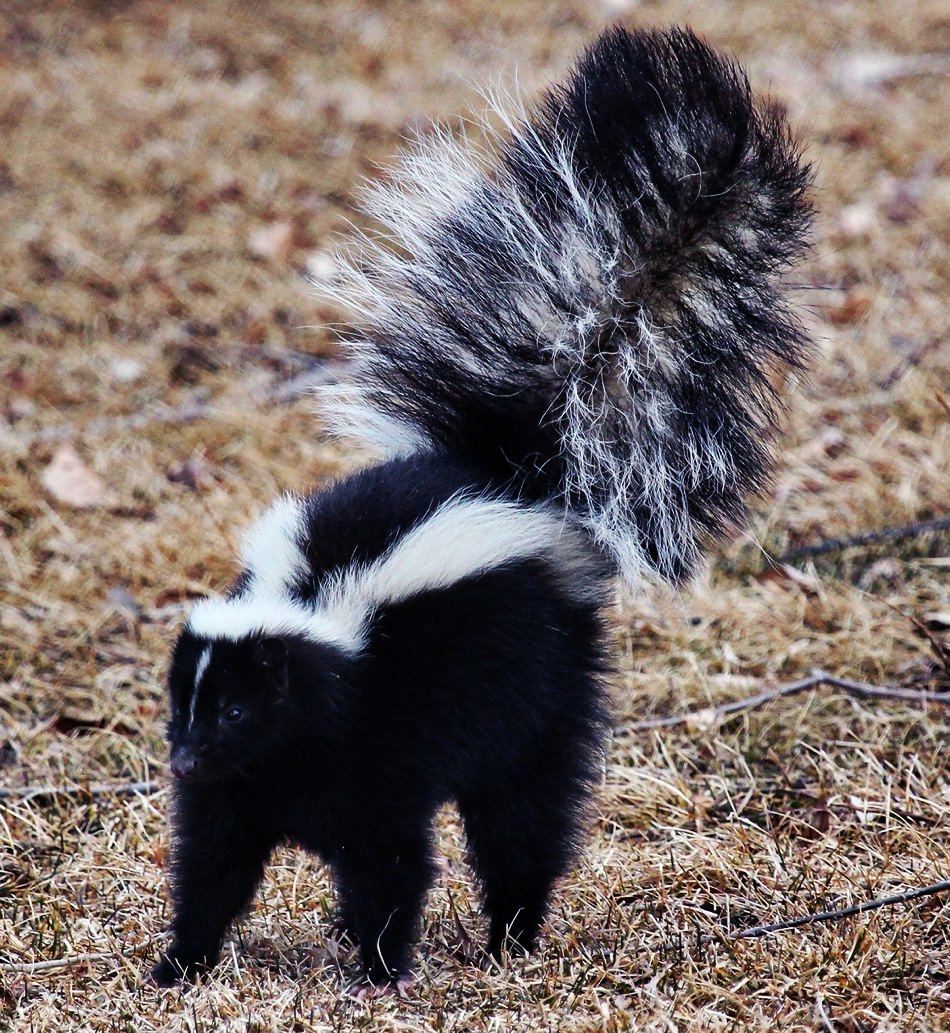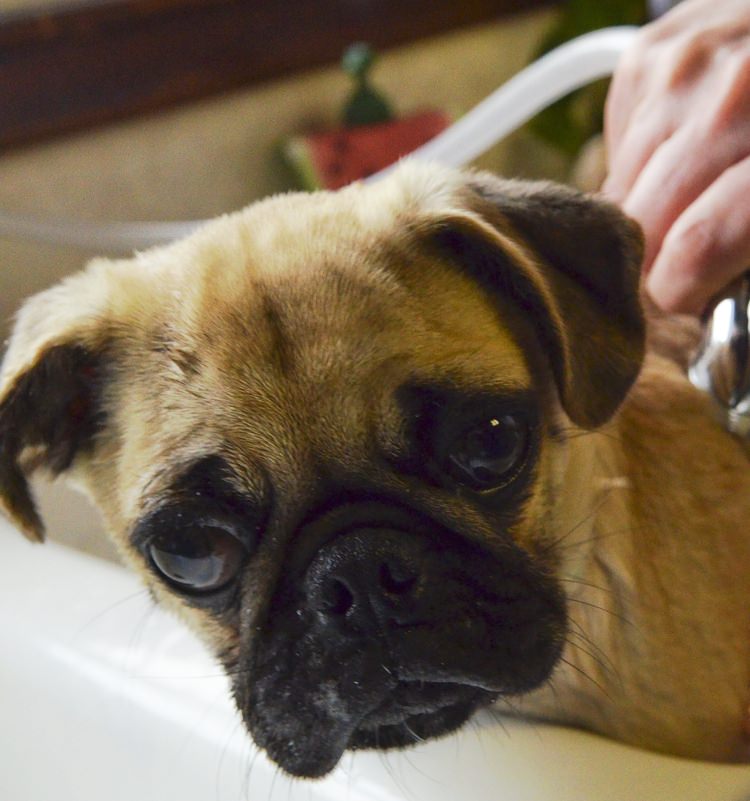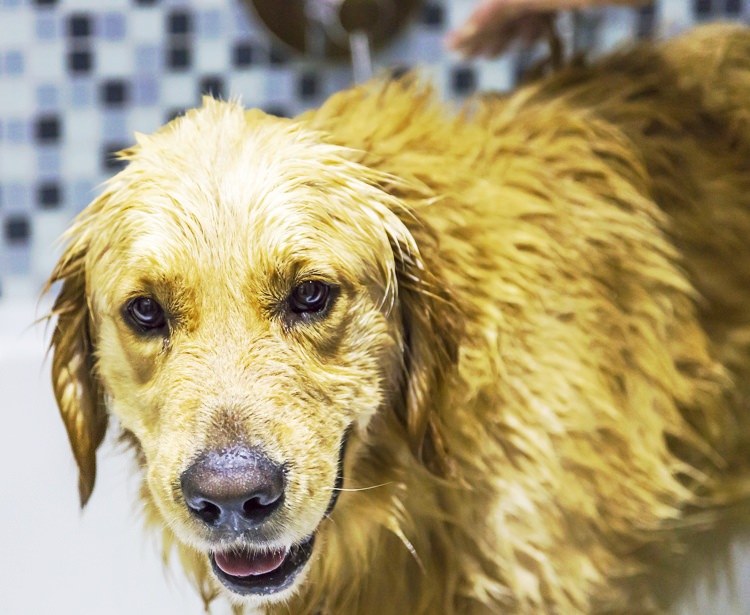
Stopping The Spread of Skunk Smell After Your Dog Is Sprayed
Posted by Jared Houliston Monday, April 15th, 2019 | 33,171 Reads
Throughout a dog’s lifetime, he or she is bound to get sprayed by a skunk, and if it’s happened to your pet, you know how quickly the odour spreads around your home, and also how difficult is it to remove.
 When it comes to a dog getting sprayed by a skunk, it’s important to do everything in your power – during the crucial first moments – to contain the situation and make sure the skunk spray doesn’t spread.
When it comes to a dog getting sprayed by a skunk, it’s important to do everything in your power – during the crucial first moments – to contain the situation and make sure the skunk spray doesn’t spread.
Steps to take to stop the spread of skunk spray
The very first piece of advice we have to give you is to remain calm. If you can remain calm and follow the steps below, you’ll greatly help your dog deal with this traumatizing and dangerous circumstance, and make sure the odour only stays in the air of your home for a few hours or less after the incident.
The best way to stop the spread of skunk spray on a dog is with two people
- Wrap your dog in a towel to protect yourself and your home from the spreading the spray
- Carry your dog to the bathtub and gently place him or her in it for washing
- Place towels on the floor of the bathroom to hinder the spread of the odour
- Don’t let your dog shake until they are completely washed
- Block your dog from jumping out of the tub
If multiple dogs have been sprayed try to get them both wrapped in a towel, carried to the bathroom for washing and remember to close the bathroom door. Bathrooms are usually smaller spaces and with a closed door you ensure that whatever odour that spreads will be contained only in that room.
The smell will be easier to get rid of because you’ll only have to wash towels which is easier to clean than having to clean carpets, furniture and clothes.
Explanation of the Above Points
1. Wrapping your dog up in towels
By wrapping your dog up in a towel you hinder the spray from spreading virtually anywhere else in your home, and you stop the odour from getting on your clothes while carrying him or her. Your clothes may smell ‘skunky’ after bathing your dog because skunk spray particles (mercaptans, or thiols) are so tiny and easily infiltrate thin fabric, but with one thorough wash the odour should be removed especially if you haven’t come into direct contact with the spray.
Skunk spray is an oily and sticky substance, so your objective is to avoid spreading it. Using protective towels will almost guarantee that you’ll have control of what the skunk spray gets into contact with.
2. Carry your dog directly to the bathtub and close the door
Immediately taking your dog directly to the bathtub or basement sink will substantially reduce the spread of the skunk spray. If you simply call your dog to the bathroom on their own, or guide him or her along, the spray will definitely spread, especially to the carpets or floors. You won’t be able to see it, and anyone that walks along that same path will spread the spray to other parts of the home too.
 Plus, if your dog was sprayed in the face, he or she won’t be able to see clearly and may have trouble breathing, and may end up rubbing against the walls and furniture, thus spreading the spray even further.
Plus, if your dog was sprayed in the face, he or she won’t be able to see clearly and may have trouble breathing, and may end up rubbing against the walls and furniture, thus spreading the spray even further.
3. Place towels on the floor
While your dog is in the bathtub or sink, have the other person with you spread towels on the floor around you. Spreading towels on the floor ensures the skunk spray does not spread in the mostly likely case that your pup decides to jump out of the tub.
Getting sprayed by a skunk can be quite shocking and traumatizing for a dog, so they may act erratically and be hard to control. Having towels on the floor during the wash will keep much of the spray from getting on the floor and being tracked throughout the rest of your house. Remember to be patient with your pup.
4. Don’t let your dog shake out his fur during the wash
Try your best to keep your hands on your dog during the wash so they feel hindered from shaking the water and spray off of themselves. Anyone who’s washed a dog knows they like to shake, but if there is still skunk spray on them when they shake, it will spread everywhere including on your clothes, the walls of the bathroom, the floor, carpets and even the sink.
The best way to hinder your dog from shaking out the water and spray is by not letting up on the wash. They don’t usually shake when they’re being touched or pet, so if you keep your hands on them until the washing is done, chances are they won’t shake.
5. Block your dog from jumping out of the tub
Blocking your pup from jumping out of the tub during the wash will decrease the chances of the skunk spray from spreading too. Most dog owners know that once a dog jumps out of a bathtub, the first thing they do is shake. One easy way to keep your dog from jumping out of the tub is by paying attention to them while you’re washing them. Talk to them by gently ensuring them they’ll be OK, and be aware of their movements so you can catch them before they take a leap out of the tub.
If they do get out of the tub and start shaking, remain calm and patient and remember they’re extremely uncomfortable or may be having a hard time breathing. If your dog does jump out, and if you’ve got the door closed with towels on the floor, at least you’ve properly prepared yourself by hindering the spray from spreading.
Can skunk spray hurt or injure your dog?
Yes. Skunk spray is highly poignant and can actually injure your dogs eyes, and severely hinder its breathing. If your dog gets sprayed you have to remain as calm as possible and assure him or her that everything is going to be OK. Your voice should be soothing and help him or her remain calm too.
DID YOU KNOW? Skunk spray can be fatal to a dog: Skunk spray contains a toxic element similar to garlic and onions that can cause fatal damage to dogs. Dogs may start vomiting or have diarrhea and death can result. There are no treatments yet available but lots of fluids can help the dog recover. (source)
If you find your dog is having a severe reaction to being sprayed by a skunk, take it to your local animal aid immediately and without hesitation.
Removing the skunk odour from your dog
 About half of the time that we are out on skunk removal calls, we also give customers advice on how to remove the skunk spray from their dog and their furniture.
About half of the time that we are out on skunk removal calls, we also give customers advice on how to remove the skunk spray from their dog and their furniture.
Popular Method
The answer is always the same: you simply mix one cup of hydrogen peroxide with a half cup of baking soda and a teaspoon of dish soap. Place that mixture into a bucket and proceed to soak your dog with it in the tub until the smell is gone from there fur. With this mixture you have to be careful not to get any of it in your dogs mouth or eyes.
Alternative Method
Another less known but extremely effective method to remove the smell of skunk from a dog is by washing him or her with baby-shampoo. As mentioned above, simply bring your dog to the bathtub, but in this case fill the tub with water up to their knees; make sure your dog is completely drenched in water and proceed to apply a very liberal amount of baby-shampoo on them.
Keep scrubbing your pup making, making sure they’re full of soap-suds, and then rinse and repeat at least 2 or 3 times. Doing this will definitely get rid of the smell fast, stop the odour from spreading and make the washing more comfortable for your dog.
Using baby-shampoo is safe for your dogs skin and enables you to wash around his or her face, and behind their ears without risking getting any harmful or burning chemicals in their eyes.
Why is your dog being sprayed?
If your dog has been sprayed by a skunk around your home, its quite possible the skunk is living under your deck or shed, especially if he or she was sprayed in your backyard. About 20% of the calls we get from homeowners for skunk removal involves a dog that has been sprayed, and a skunk living under their deck.
If you suspect you have a skunk living on your property, and/or your dog has been sprayed, having the skunk professionally removed may be your only recourse. If you don’t have a dog or other pets that go outside, but continually smell the skunk odour, its still best to have it removed so it can’t spray your children or visitors.
Not to mention that if for some reason the skunk has sprayed in your backyard (e.g. after being attacked by another animal) you could track that smell into your home yourself if you’ve come into contact with it without knowing.
5 Responses to “Stopping The Spread of Skunk Smell After Your Dog Is Sprayed”
Leave a Reply
Ontario Wildlife Removal Inc. provides wildlife removal and pest control in Southwestern Ontario, including Brantford, Kitchener-Waterloo, Cambridge, Guelph, London, Woodstock, Tillsonburg, Simcoe, Port Dover, Paris, St. George, Six Nations, Caledonia, Burlington, Waterdown, Oakville, Hamilton, Stoney Creek, Grimsby, & Niagara Region. Our methods are safe, humane and environmentally friendly. Call today to book your inspection.
Get a Pest Control Quote
Simply fill in your details below and we'll call you very shortly to discuss your issues.





Wearing rubber gloves, wash your dog with this solution immediately after they’ve been sprayed. DO NOT get the solution in their eyes. (If you don’t have peroxide, baking soda, and liquid soap on hand, use vinegar diluted with water.)
This alert is especially important to do before releasing dogs into the yard. Especially at night, be sure to provide an alert and give skunks (and all wildlife!) a few minutes to hide before letting dogs into the yard.
This is a good idea…
BEFORE stepping into your yard, especially at night, let skunks know you re coming. Skunks have poor eyesight, they re not fast and they can t climb. They don t want to encounter you or your pets, so if give them some notice that you want to use your yard, they will almost always vacate it ahead of you. They don’t want to interact with you any more than you do with them!
We always have the same advice for people concerned about skunks— give them the opportunity to escape without spraying and they will probably do so! Flip on the porch light. Make noise opening the door. Clap your hands. Whistle. Do a little tap dance. You might feel slightly silly, but this little bit of warning will alert any skunks passing through that you re coming out, and give them time to exit your yard or hide.